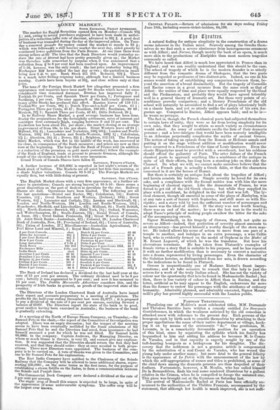g#t 114tatrto.
A natural feeling for antique simplicity in the construction of a drama seems inherent in the Italian mind. Scarcely among the Greeks themselves do we find such a severe abstinence from heterogeneous ornament as with Alfieri; and Norma, though merely the book of an opera, is much more akin to the productions of Euripides than most modern tragedies commonly so called. We have heard that Alfieri is much less appreciated in France than in England ; and we can readily understand that this should be the case. The wheel of tragedy of which he is the modern founder is so utterly different from the romantic drama of Shakspere' that the two poets may be regarded as professors of two distinct arts. Indeed, no one in his senses would dream of establishing any comparison between them, beyond the assertion of a broad dissimilarity. But the tragedy of Corneille and Racine comes in a great measure from the same stock as that of Alden: the unities of time and place were equally respected by the Gaul and the Piedmontese, and probably they would have agreed tolerably well in a general theory of dramatic art. But those very points of resemblance provoke comparison ; and a literary Frenchman of the old school will naturally be astonished to find a set of plays laboriously built on a classic basis, and yet so utterly unlike the models of his own Augustan age. Compared to Racine, Alfieri appears bald ; and so he is— he wears no peruque. The fact is, though the French classical poets had subjected themselves to certain laws of unity, they were so far from loving simplicity for its own sake, that they sought to attain as much variety as circumstances would admit. An army of confidants swells the lists of their dramatis persona); and a love-intrigue that would have been scarcely intelligible to an Athenian perpetually complicates the myths of ancient Greece. The notion of taking an episode from the Roman or Hellenic annals and putting it on the stage without addition or modification would never have occurred to a Frenchman of the time of Louis Quatorze. Even the chaste Hippolytus must be provided with a sweetheart, lest his coldness should offend the gallantry of Paris, The utter failure of the French classical poets to approach anything like a semblance of the antique in spite of all their efforts, has long been a standing joke on this side the Channel. Do what we will, we cannot make ourselves believe that the plot of a French play is actually a Greek fable, or that the characters concerned in it are the heroes of Homer.
But there is certainly an antique look about the tragedies of Allen; and herein consists his baldness. Simple severity he loved for its own sake, and a compliance with the formal unities was with him the mere beginning of classical rigour. Like the dramatists of France, he was forced to get rid of the old Greek chorus; but while they supplied its place with a confidant, he delighted in the void that was left. The lyrical element, though all essential in some of the plays of 2Eschylus, was at any rate a sort of luxury with Sophocles, and still moro so with Euiipides ; and a story told by just the sufficient number of personages and no more was the ideal of Alfieri. If the story was not worth hearing, there was an end of the matter; he was the last man in the world to adopt Tasso's principle of making people swallow the bitter for the sake of the accompanying sweets. Signor Montanelli, in his tragedy of Comma, though not quite so severe as Alfieri—indeed, that perfection of severity almost amounts to an idiosyncracy—has proved himself a worthy disciple of the stern master. He indeed allows his scene of action to move from one part of a temple to another, and indulges in an extra personage, a wise Celtic bard, who is evidently formed on the model of Orpheus in the Meded of M. Ernest Legouve, of which he was the translator. But here his aberrations terminate. He has taken from Plutarch's examples of female virtue a story that is suitable to his purpose, and he has repeated it with no further modification than is necessary to convert a narrative into a drama represented by living personages. Even the character of the Galatian heroine, as distinguished from her acts, is drawn according to the indications to be found in Plutarch.
Comma is unquestionably one of Madame Ristori's finest impersonations; and we take occasion to remark that this lady is just the actress for a work of the truly Italian school. She has not the variety of colour nor the spontaneity that is to be found in Mademoiselle Rachel ; but then, there is less variety of colour in Alfieri than in Racine, and the latter, artificial as he may appear to the English, endeavours far more than the former to endow his personages with the attributes of ordinary humanity. Admirably planned, and admirably executed, Signor Montenelli's play has proved highly successful with the London public.


























 Previous page
Previous page